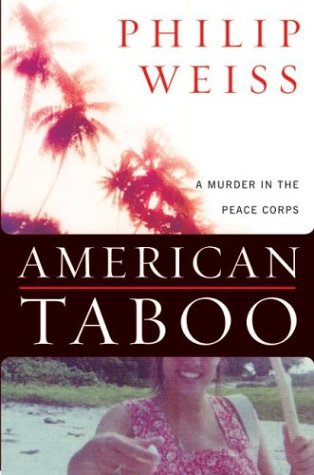June 27, 2004: Headlines: COS - Tonga: Crime: Mruder: Safety and Security of Volunteers: The Oregonian: Making peace with the past in Tonga
Peace Corps Online:
Directory:
Tonga:
Special Report: 'American Taboo: A Murder in the Peace Corps':
June 27, 2004: Headlines: COS - Tonga: Crime: Mruder: Safety and Security of Volunteers: The Oregonian: Making peace with the past in Tonga
American Taboo: A Murder in the Peace Corps
 | Charges possible in 1976 PCV slaying
Congressman Norm Dicks has asked the U.S. attorney in Seattle to consider pursuing charges against Dennis Priven, the man accused of killing Peace Corps Volunteer Deborah Gardner on the South Pacific island of Tonga 28 years ago. Background on this story here and here. |
 | American Taboo
Read the story of Volunteer Deborah Gardner's murder in Tonga in 1976 and how her killer has been free for the past 28 years with the help of the Peace Corps. Read an excerpt from Philip Weiss' book documenting the murder and coverup. Then read an essay by RPCV Bob Shaconis who says that Peace Corps' treatment as a "sacred cow" has exempted it from public scrutiny and that the agency has labored to preserve its shining reputation, sometimes at the expense of the very principles it is supposed to embody. |
Making peace with the past in Tonga

Making peace with the past in Tonga
Making peace with the past
Philip Weiss searches for justice in the 1976 killing of a Peace Corps volunteer
Sunday, June 27, 2004
STEVE DUIN
In "American Taboo: A Murder in the Peace Corps," Philip Weiss has stretched a compelling magazine expose into an uneven book, but it's hard to fault his motivation.
Deborah Ann Gardner was, by all accounts, a vivacious 23-year-old teacher from the Tacoma area who volunteered for the Peace Corps in 1975 and was dispatched to Tonga, a small island in the South Pacific. She was soon entangled with a guy named Dennis Priven, who would murder her 10 months later -- "the only time in 43 years and 175,000 volunteers," Weiss notes, "that a Peace Corps volunteer has been found to have killed anyone."
Alas, that murderer skated, with the compliance of a Peace Corps hierarchy -- including the director, Oregon's John Dellenback -- who seemed more empathetic to the killer than to the young woman who was stabbed 22 times. One Tongan summed up the islanders' disgust: "All the pity was with Priven and none was shown to the dead girl."
Gardner and Priven arrived in Tonga in the mid-'70s when the Peace Corps was 10 years past its prime but still inspiring volunteers who thought the agency was the perfect antidote to the legacy of the Ugly American.
"Every volunteer got the Peace Corps handbook, which expressed the idea in almost religious terms," Weiss writes. "Volunteers had a powerful role to play in the world. They were eliminating hunger, disease, ignorance, injustice and hopelessness.
"And along with that power came responsibility. A volunteer was responsible for his own behavior. A volunteer 'can expect no special treatment.' The code was so absolute that if a volunteer got into trouble, the agency wasn't going to spend any money to defend him, though it might help find a lawyer."
Priven, then, proved to be an anomaly in more ways than one. During his trial, he was aided by a New Zealand attorney and a Hawaiian psychiatrist, both of whom were instrumental in ensuring Priven was found not guilty of the murder by reason of insanity.
Three months after Gardner's death, Priven was transported from Tonga to the United States, handcuffed to the Peace Corps' insistence that he would be institutionalized in his home country for up to 10 years. Instead, he was greeted by a bureaucracy so determined to sweep him under the rug that it barely noticed when he slipped out the door.
Weiss first learned of Gardner's death when he was a 22-year-old kid traveling in Samoa. It would be another 20 years before he would begin to investigate the crime and he has done a masterful job, given the span of years, in exhuming the facts of the case.
He errs on the side of too much detail, particularly in his re-creation of the trial, and it is never clear what he gained in a three-hour off-the-record conversation with Priven, whom he eventually tracked down in Brooklyn in 2002.
But Weiss is succinct and unsparing in his final conclusions about the case: "What a few self-important American officials did in the Priven case was indefensible. They manipulated the Tongan justice system to get the verdict they wanted . . . (T)hey misled Deb's family . . . They did so to preserve their own careers, to preserve the American presence in the South Pacific, to preserve the churchly image of the Peace Corps.
"Of course, in doing so, they also served the interests of a murderous criminal."
Steve Duin is The Oregonian's Metro columnist. Reach him at 503-221-8597 or steveduin@aol.com.

Some postings on Peace Corps Online are provided to the individual members of this group without permission of the copyright owner for the non-profit purposes of criticism, comment, education, scholarship, and research under the "Fair Use" provisions of U.S. Government copyright laws and they may not be distributed further without permission of the copyright owner. Peace Corps Online does not vouch for the accuracy of the content of the postings, which is the sole responsibility of the copyright holder.
Story Source: The Oregonian
This story has been posted in the following forums: : Headlines; COS - Tonga; Crime; Mruder; Safety and Security of Volunteers
PCOL12082
93
.



